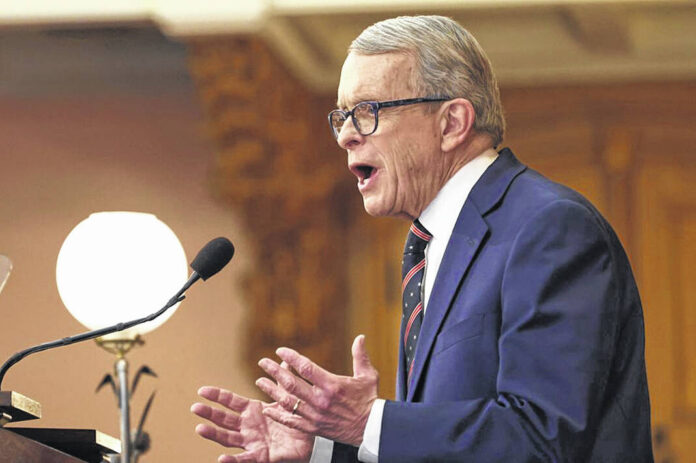COLUMBUS — Gov. Mike DeWine this week endorsed the idea of dumping the elected officials in charge of setting Ohio’s political districts, in favor of a nonpartisan commission, although a spokesman said the “devil’s in the details” when it comes to his possible support of how to do it.
DeWine told the Toledo Blade’s editorial board this week that the way redistricting played out in Ohio last year shows the reform system voters approved in 2015 and 2018 already is broken.
“Taking it out of the hands, frankly, of elected officials is probably a good idea,” DeWine said. “How we do that, though, to make sure it is done in an impartial way, is a difficult challenge.”
DeWine is a member of the Ohio Redistricting Commission, a panel of elected officials who drew the state legislative and congressional district maps used during last year’s election. Republicans, including DeWine, hold five of the commission’s seven seats, since they currently hold all of Ohio’s statewide, executive offices.
The redistricting commission was created as part of anti-gerrymandering reforms, which were meant to give more input to the minority party in drawing state legislative and congressional districts. But in practice for the first time last year, the system failed to yield a bipartisan compromise and descended into dysfunction.
Matt Huffman and Bob Cupp, the Republican legislative leaders, dominated the process, initially freezing out even the statewide Republican officials on the commission by refusing to give them access to their mapping experts or the expensive software used to draw the maps.
The Ohio Supreme Court rejected five sets of state legislative maps, and two sets of congressional maps, as illegally gerrymandered in favor of Republicans. The rulings came in identical 4-3 votes, with Republican Chief Justice Maureen O’Connor joining the court’s three Democrats in rejecting the maps. Republicans eventually took to ignoring the court’s orders and even floated impeaching O’Connor, while O’Connor floated holding members of the redistricting commission in contempt of court.
The delays in approving maps caused Republican state lawmakers to schedule an unprecedented second election for state legislative races in August, which saw record low levels of voter participation and cost millions of dollars. And the maps Ohio did use had been found to be illegal, pro-Republican gerrymanders, although Democrats ended up netting an extra seat in the November congressional races.
In short, the process didn’t work well.
O’Connor has since left the court due to age limits for judges and now is part of an effort to present a new redistricting reform to voters as soon as next year. O’Connor has said a nonpartisan citizen’s commission should be in charge of redistricting since politicians are unwilling to take steps to diminish their own power.
DeWine wasn’t immediately available to elaborate on his thoughts. But in an interview, DeWine spokesperson Dan Tierney reiterated to cleveland.com and The Plain Dealer the governor’s criticisms of how the process played out last year.
DeWine has said Republicans and Democrats on the redistricting commission failed to compromise despite initial signs they might be able to do so. He’s also criticized the Ohio Supreme Court for what he viewed as a too-large emphasis on designing districts that favor each party to win seats in proportion to their share of the statewide vote, at the expense of designing a greater number of districts that either party could win.
Tierney didn’t rule out DeWine supporting a citizen-led redistricting reform like the one O’Connor is helping to organize. But he said any proposal would need buy-in from both Republicans and Democrats.
“Ideally, if you can get a bipartisan coalition together to support a nonpartisan redistricting commission, that’s the ideal,” Tierney said. “Whether we can get there, the devil’s in the details. I imagine key legislators would be involved as they were the last time.”
Jen Miller, president of the League of Women Voters of Ohio, a group that’s pushed for redistricting reform in Ohio for decades, said redistricting advocates are doing research for the possible 2024 ballot measure.
In the group’s research, Miller said, “Politicians, sitting elected officials, are unable to put their own interests aside to make districts that truly serve the people of Ohio. So we agree, we need to have a constitutional amendment that calls for an independent commission.”







